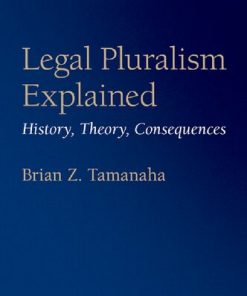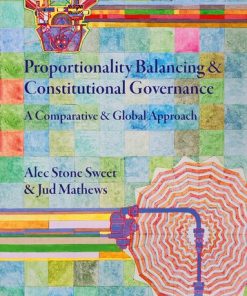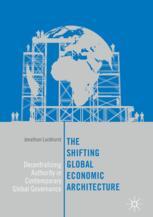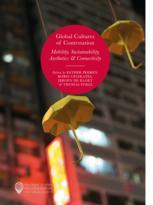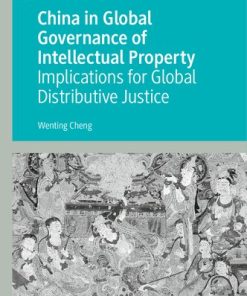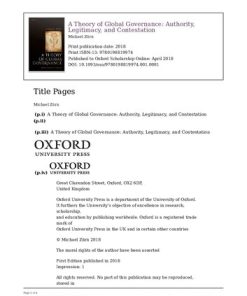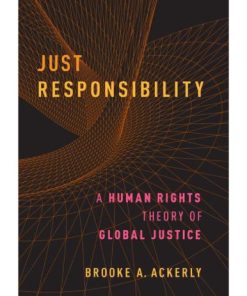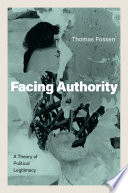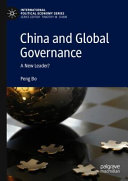(Ebook PDF) A Theory of Global Governance Authority Legitimacy and Contestation 1st edition by Michael Zürn 0192551817 9780192551818 full chapters
$50.00 Original price was: $50.00.$25.00Current price is: $25.00.
A Theory of Global Governance : Authority, Legitimacy, and Contestation 1st edition by Michael Zürn – Ebook PDF Instant Download/DeliveryISBN: 0192551817, 9780192551818
Full download A Theory of Global Governance : Authority, Legitimacy, and Contestation 1st edition after payment.
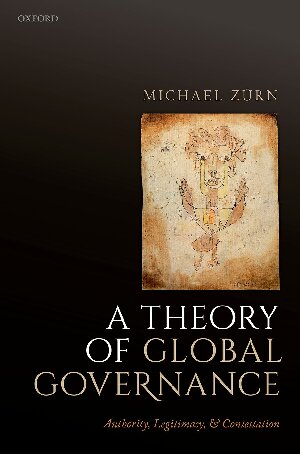
Product details:
ISBN-10 : 0192551817
ISBN-13 : 9780192551818
Author : Michael Zürn
This book offers a major new theory of global governance, explaining both its rise and what many see as its current crisis. The author suggests that world politics is now embedded in a normative and institutional structure dominated by hierarchies and power inequalities and therefore inherently creates contestation, resistance, and distributional struggles. Within an ambitious and systematic new conceptual framework, the theory makes four key contributions. Firstly, it reconstructs global governance as a political system which builds on normative principles and reflexive authorities. Second, it identifies the central legitimation problems of the global governance system with a constitutionalist setting in mind. Third, it explains the rise of state and societal contestation by identifying key endogenous dynamics and probing the causal mechanisms that produced them. Finally, it identifies the conditions under which struggles in the global governance system lead to decline or deepening. Rich with propositions, insights, and evidence, the book promises to be the most important and comprehensive theoretical argument about world politics of the 21st century.
A Theory of Global Governance : Authority, Legitimacy, and Contestation 1st Table of contents:
Part I. The Global Governance System
1. Normative Principles
1.1 Global Common Goods
1.2 Individual Rights and Entitlements of Non-state Actors
1.3 The Possibility of International Authority
2. Reflexive Authorities
2.1 Public Authority as a Core Concept of the Political
2.2 Conceptions of Public Authority
2.3 Reflexive Authority
2.4 Two Types of Authority in Global Governance
2.5 The Relationships between Authorities
2.6 Conclusion
3. Legitimation Problems
3.1 The Authority–Legitimation Link
3.2 Sources of Legitimacy: The Impartial Pursuit of a Shared Social Purpose
3.3 Legitimation Narratives
3.4 Legitimation Problem I: Technocratic Bias
3.5 Legitimation Problem II: Biased Exercise of Authority
4. The Theoretical Model: Causal Mechanisms and Hypotheses
4.1 Historical Institutionalism
4.2 Reactive Sequences
4.3 The Authority–Legitimation Link
4.3.4 And Six Propositions
Part II. The Contestation of Global Governance
5. The Rise of the Global Governance System: A Historical-Institutionalist Account
5.1 Empirical Patterns of International Authority
5.2 The End of the Second World War as a Critical Juncture
5.3 The Self-Reinforcement of Post-Second World War Institutions
5.4 Reactive Sequences and Transnational Norm Entrepreneurs
5.5 The Fall of the Wall and the Rise of the Global Governance System
5.6 Public Authority in the Global Governance System
5.7 Releasing Functional Differentiation
5.8 Conclusion
6. The Politicization of Authority beyond the Nation State
6.1 What is Politicization?
6.2 Why is there Politicization? What are its Effects?
6.3 The Politicization of the European Union
6.4 The Politicization of Other International Institutions
6.5 Effects of Politicization
6.6 Conclusion
7. Counter-Institutionalization in the Global Governance System
7.1 Rising and Established Powers in the Global Governance System
7.2 The Faces of State Power
7.3 Are We Witnessing System Change?
7.4 Counter-Institutionalization by Rising Powers
7.5 Counter-Institutionalization by Established Powers
7.6 Conclusion
8. The Deepening of Global Governance
8.1 Improved Legitimacy via Societal Pressures
8.2 Human Rights Provisions in International Organizations
8.3 The Findings
8.4 Scope Conditions
8.5 Conclusions
Part III. The Future Of Global Governance
9. Are there Realistic Models of Global Governance with Cosmopolitan Intent? An Empirical Assessment
9.1 About a Difficult Relationship
9.2 Four Models of Global Institutional Order with Cosmopolitan Intent
9.3 Empirical Presumptions of the Four Models
9.4 Contributory Trends: Who is Right in which Respect?
9.5 Conclusion
10. Conclusion: A New Paradigm in International Relations?
10.1 The Global Governance System and its Legitimation Problems
10.2 Politicization and Counter-Institutionalization
10.3 Decline or Deepening?
10.4 A Global Politics Paradigm on the Rise?
10.5 Future Research
People also search for A Theory of Global Governance : Authority, Legitimacy, and Contestation 1st:
a theory of global capitalism
theories of global governance
a theory of government
concept of global governance
the theory of global governance
Tags:
A Theory,Global Governance,Authority,Legitimacy,Contestation,Michael Zürn
You may also like…
Jurisprudence & Law - Legal Theory & Philosophy
Politics & Philosophy - Social Sciences
Politics & Philosophy
Politics & Philosophy
Global Cultures of Contestation: Mobility, Sustainability, Aesthetics & Connectivity 1st Edition
Politics & Philosophy - Social Sciences
Politics & Philosophy
A Theory of Global Governance: Authority, Legitimacy, and Contestation Michael Zurn
Politics & Philosophy - Social Sciences
Just Responsibility: A Human Rights Theory of Global Justice




